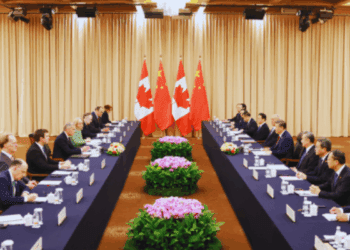By Natalie Ecanow, September 5, 2023
Canada recently imposed sanctions on former Lebanese Central Bank Governor Riad Salameh and two of his associates “for their involvement in acts of significant corruption.” Canadian Minister of Foreign Affairs Mélanie Joly announced the designations in coordination with the United States and United Kingdom. But all three countries stopped short of sanctioning the Banque du Liban (BdL), which under Salameh’s leadership provided financial services and money laundering cover to Iran-backed Hezbollah for over a decade.
Riad Salameh became governor of the BdL in 1993 after working as an investment banker at Merrill Lynch. He vacated the post at the BdL when his fifth term ended on July 31. His tenure as custodian of Lebanon’s banking sector spanned thirty years, including the collapse of the economy over the last half decade.
Salameh rose to prominence following Lebanon’s civil war, which lasted from 1975 to 1990. For decades, the international banking community praised Salameh for revitalizing Lebanon’s economy and keeping it stable amidst political turmoil, war with neighboring Israel, and the 2008 financial crisis. For his accomplishments, the BdL governor received numerous accolades, including “Central Banker of the Year” multiple times.
But when Lebanon’s financial sector cratered four years ago, Salameh’s reputation collapsed with it. When Salameh retired, The Economist named him the “world’s worst central banker.” His policy of borrowing money to pay creditors—effectively a state-run Ponzi scheme—ultimately plunged Lebanon into what the World Bank ranks as one of the worst economic disasters in modern history.
As of today, soaring inflation has caused the Lebanese lira to lose 98 percent of its value, officially falling to over 15,000 lira to the dollar, though actual exchange rates in Lebanon are significantly worse than reported figures. Today, 80 percent of Lebanon’s population lives in poverty; many are unable to access their own money from the banks. On multiple occasions ordinary civilians have held up banks in order to retrieve their own savings.
Salameh is now under investigation across Europe for suspected money laundering and embezzlement. Switzerland, for example, opened an investigation into Salameh’s practices in 2021 after a human rights organization alleged that the BdL governor and his brother Raja diverted over $300 million in central bank transactions between 2002 and 2015 “through layered shell companies.” France opened another probe after a domestic anticorruption group claimed that the Salameh brothers and their BdL colleague Marianne Hoayek laundered millions through luxury real estate. Ottawa also sanctioned Raja Salameh and Marianne Hoayek as part of the recent designations.
Germany, Luxembourg, and Liechtenstein are also investigating Riad Salameh’s banking practices. In May, France and Germany issued international arrest warrants against the then BdL governor. Interpol issued similar warrants for financial crimes —“red notices”—against Salameh on May 19 and May 30.
What the European investigations and designations miss, however, is Riad Salameh’s complicity in these crimes with the Iran-backed terrorist group Hezbollah.
Hezbollah dominates the Lebanese political order. Its members and allies run virtually every state institution, and the BdL is not immune. For at least a decade, Lebanon’s central bank has allowed Hezbollah to access the country’s banking system for illicit purposes.
A lawsuit filed in New York, for example, claims that 12 Lebanese banks “knowingly provid[ed] extensive and sustained material support, including financial services, to Hezbollah and its companies, social welfare organizations, operatives, and facilitators.”
When the United States sanctioned a Hezbollah money exchanger in January, the U.S. Treasury explicitly noted a license from the BdL “to transfer money within Lebanon and abroad.”
This all took place under Riad Salameh’s watch. And the recent actions by Canada, the United States, and United Kingdom are too little and too late. Lebanon is now a failed state. And Salameh played a significant role.
Canada’s Minister of Foreign Affairs said that the “sanctions send a clear message that Canada will not tolerate the acts of significant corruption that have contributed to Lebanon’s economic collapse.” If she intends to back that up, there’s more Ottawa can do.
Almost eighteen months ago, Beirut reached an agreement with the International Monetary Fund (IMF) to rescue its crippled economy. But the country’s Hezbollah-dominated government has failed to implement critical reforms needed to unlock the $3 billion IMF bailout. This includes “strengthening governance, anti-corruption, and anti-money laundering” frameworks, which Canada can push for through the Financial Action Task Force (FATF)—a financial standards setting body of which Ottawa is a member.
Last month also marked three years since a devastating explosion rocked the Port of Beirut. Over 200 people died in the blast, including two Canadians. Evidence suggests that corruption and mismanagement at the Hezbollah controlled port led to the disaster. Yet, Hezbollah continues to obstruct judicial investigations. To this day, no one has been held accountable. Here, too, Canada should push for justice.
To top it all, Lebanon has been without a president since the fall when former President Michel Aoun’s term ended in October. Parliament has failed 12 times to elect a successor, largely due to Hezbollah’s chokehold on the elections process. Ottawa should consider diplomatic pressure here, as well, to prevent Hezbollah from subverting processes and inserting its preferred candidate as president.
Canada will certainly not be able to change things overnight. Hezbollah still holds sway in Lebanon and the country’s institutional status quo, however broken, remains untouched. But the message should be clear: The buck does not stop with Riad Salameh.
Natalie Ecanow is a research analyst at the Foundation for Defense of Democracies, a non-partisan research institute in Washington, DC, focusing on national security and foreign policy. Follow FDD on Twitter @FDD.






